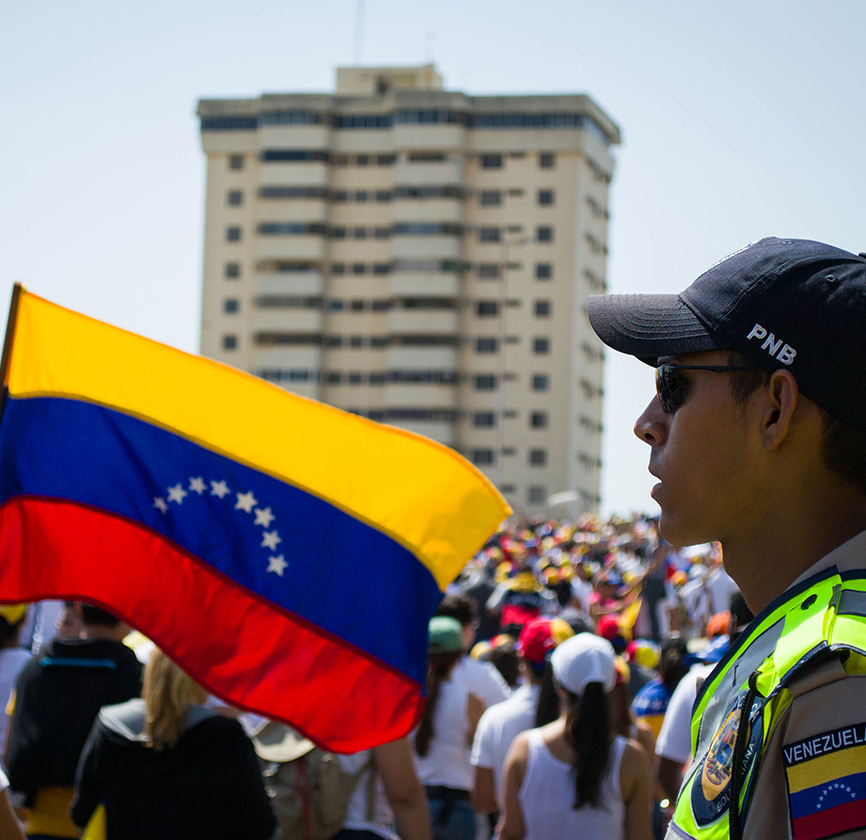For the past several years, Venezuela has been a political and economic disaster area.Here's Risa Grais-Targow, Director in Eurasia Group's Latin America Practice, on where the current crisis is headed and why this country may well have brighter days ahead.
Willis Sparks: Simply replacing embattled President Nicolas Maduro with another chavista won't solve Venezuela's larger problems. How is the larger crisis likely to end?
Risa Grais-Targow: The only way out of this crisis is real regime change to an opposition-led government. A chavista successor won't be able to unwind the policy framework without access to significant international financing, which is key to jump-starting the non-oil economy and offsetting painful but necessary economic reforms.
As we see from the current political stalemate and delayed recall vote, the country's institutions don't have a way of solving the current crisis. The military is fully vested in the survival of this regime and the government has the institutional control to delay a recall vote into 2017, at which point the vice president would take over. That means that the streets remain the most viable avenue to force more fundamental regime change, since that is the one catalyst that could change the military's preferences. If they are asked to shoot civilians mobilizing in the streets in order to defend the government, I think they will come to the table and negotiate an exit. The latter will necessarily entail setting a new timetable for elections that the opposition would almost certainly win.
Absent massive mobilizations, more fundamental regime change won't come until the 2018 elections. However, to the extent that a chavista successor won't be able to meaningfully solve problems like soaring inflation and bare shelves at grocery stores, the risk of the masses taking to the streets will remain significant. Though not impossible, it's hard for me to see an unpopular chavista successor able to finish out Maduro's full term.
Sparks: Oil exports are crucial for the economy of Venezuela, a founding member of OPEC. If a more market-friendly government came to power in Caracas, how long would it take to turn state-owned oil company PDVSA around and see production growth?
Grais-Targow: Venezuela has the largest oil reserves in the world and relatively low production costs but significant above-ground risks. An opposition government would likely prioritize improving the oil sector framework in order to attract foreign investment. This would include changes to the foreign exchange regime (it is too expensive for foreign firms to pay local employees and suppliers at the official rate), and a more favorable fiscal framework, as well as changes to the legal requirement that PDVSA keep majority ownership of all projects.
However, even if prioritized, changes to the ownership scheme and fiscal terms require congressional approval. A new government would also look to settle PDVSA's debts with service providers and suppliers of lighter crude necessary for blending with Venezuela's heavier crude. It could also use international financing to maintain and improve basic infrastructure. These changes could stabilize production within a year.
That said, significant production
growth would probably take four to five years. PDVSA's existing partners will probably start to invest once there is an improvement in the policy framework, but it will take time to build needed infrastructure, like upgraders for Venezuela's heavy crude. Moreover, international oil companies will want to ensure that Venezuela's above-ground risks have truly dissipated and that a market-friendly government has staying power. This means that PDVSA's partners will probably wait to see that a new government has consolidated power before significantly increasing investment, while other international oil companies will probably be cautious about returning to or entering the market until political stability is guaranteed.
Sparks: Are you optimistic about the country's longer-term future? Why or why not?
Grais-Targow: I am optimistic. Venezuela is an incredibly wealthy country in terms of resources, and its myriad problems stem from severe economic mismanagement. In that sense, a rational economic policy framework aided by international financing can lead to major improvements in both the economic outlook and Venezuelans' quality of life, which has dramatically declined over the past several years.
Undoing the current foreign exchange and price controls and restarting the productive sectors of the economy will not be easy or happen overnight. It will also require technical assistance from the international community as well as significant international financing. However, Venezuela is starting from a very low base in terms of the current economic reality so you can see relative improvements starting to occur in a relatively short period of time. Once there is a meaningful improvement in the policy framework and political stability is restored, I think you will see investment flowing back into the country that helps bring about an economic recovery.
Moreover, with a serious anti-inflation plan, Venezuelans will see an improvement in their real income, which in turn, will drive demand. We've seen Venezuela's development indicators such as poverty and real income deteriorate because of the deep economic contraction and inflation. An economic recovery and price stability can therefore bring about an immense improvement in Venezuelans' quality of life.

